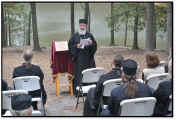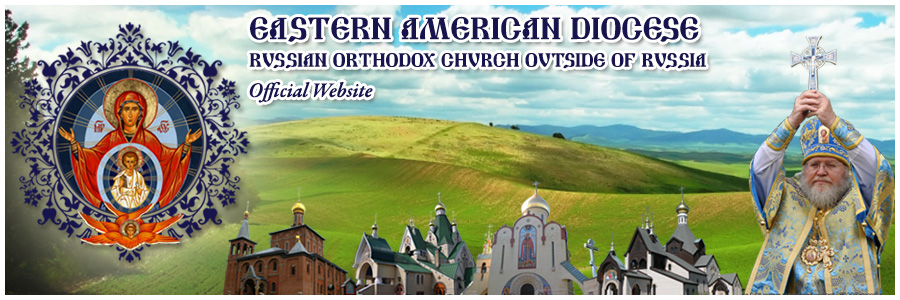Русская
Версия

 October
23, 2009 - 12:50 PM
October
23, 2009 - 12:50 PM
Atlanta:
Diocesan Secretary Archpriest Serge Lukianov delivered the State of
the Diocese Address
The
second day of the pastoral conference was dedicated to missionary
efforts and addressing the current state of affairs in the diocese.
After the conclusion of the media office presentation, diocesan
secretary Archpriest Serge Lukianov delivered the following State
of the Diocese address:
Your Eminence, Your Graces, Reverend Fathers and distinguished
matushkas. I stand before you here today to deliver a report on the
state of our diocese and the progress which has been made by the
recently elected Diocesan Council. Since being elected, the Diocesan
Council has met in session four times and two more sessions are
planned for 2009. The Diocesan Council consists of the following
members: All three hierarchs, Archpriest Victor Potapov, Archpriest
Serafim Gan, Priest John Moses as Southern Liaison, Priest Nikolai
Manduke, Priest Jonah Campbell as treasurer, Subdeacon George
Schatiloff, Mr. George Nikolsky, Mr. Serge Lopouchine and me as
secretary. The role of the Diocesan Council is to assist the ruling
bishop and vicars in governing and operating our very large diocese.
An agenda is laid out at every meeting for the Metropolitan’s
approval and then members of the Council are assigned specific tasks
to complete between meetings.
Since
the Diocesan Council meets every two months and many members live far
away from each other, an administrative office of paid part-time
staffers was created to handle day-to-day operations. The treasurer,
two media office staff members and the secretary make up the diocesan
administrative office. The main goal of this office is to make sure
that the resolutions of the Diocesan Council are implemented
successfully.
The
first meeting of the Diocesan Council in March was the most crucial,
because during that session, the following restructuring plan was laid
out:
1)
The diocesan
administration would be moved from the Synod in New York City to
St. George’s Church in Howell, NJ.
2)
The spiritual court
was to be restructured with new members while former experienced
members would act as advisors and counselors.
3)
The Diocesan
Council would meet on a bi-monthly basis.
4)
The auditing
committee would carefully inspect all financial records of
previous years and conduct regular audits of current diocesan
finances.
5)
A bilingual
diocesan website would be launched to act as the main information
highway in the diocese.
6)
A diocesan media
office would be created to manage the website and all other media
operations in the diocese.
7)
A diocesan music
commission (the EADMC) would be created to handle all music
related projects and help local parish choirs.
8)
A southern liaison
would be appointed to assist Bishop George in presenting issues to
the diocesan council which are unique to the South.
9)
A diocesan youth
association would be formed to organize and expand youth
activities within the diocese.
This
plan was laid out before the delegates of the Diocesan General Meeting
in March and I am pleased to report that the Diocesan Council and
administration have completed all of these projects within the first
three months of taking office.
Currently
the Diocesan Council is working on a series of new projects that will
benefit the diocese:
1)
An investigative
committee has been formed to research the possibility of getting a
diocesan health insurance plan and benefits for all clergymen.
2)
The formation of a
committee was commissioned to assist clergymen with immigration
issues.
3)
The diocesan media
office is researching the possibility of opening a diocesan
publishing house, which will print a monthly diocesan newsletter
and other publications such as bilingual service books.
4)
The media office is
currently working on printing clergy identification cards.
5)
A Lenten retreat
and pastoral conference is being organized at St. John the Baptist
Cathedral in Mayfield, PA.
As
you can see, the administration has been working very diligently on
your behalf to effectively restructure and revive the diocese.
There
are many challenges that we face today, especially because the Evil
One will not rest in trying to destroy the Holy Church of Christ.
Temptations present themselves in many different forms, and the only
way we can overcome them is with prayer and unity. The diocese is not
only comprised of bishops and clergymen, but of every Orthodox
Christian who comes to our churches in search of eternal salvation.
Therefore, if we are to overcome our challenges, we must do so
together as brothers and sisters in Christ.
Our
Lord and Savior has given us the Holy Church, and His Holy Apostles
ordained bishops, priests, and deacons to carry out the spiritual and
earthly functions of the Church. Every single clergyman has a
predetermined position within the church. The deacons assist the
priests in performing the Holy Sacraments, and the priests assist the
bishops by caring for their spiritual flocks. Our hierarchs are the
princes of the Church and together they comprise the Bishop’s
Council which is the highest authority in the Church. No bishop is
higher than the collective Sobor of Bishops, and no priest is higher
than his bishop.
The
reason we have a Church hierarchy is to preserve order and peace
within the Holy Church, and because we live in the secular world,
there are certain rules that govern the earthly aspect of the Church.
In 1956, the Sobor of Bishops approved a set of regulations for all
dioceses and parishes of the Russian Orthodox Church Abroad. These
regulations are known as the normal parish by-laws, and they are
available in full on the official ROCOR website. In recent decades,
the Russian Orthodox Church has gone through a very difficult period
and has at times, strayed from its traditions. We have been blessed to
live in a time when the Local Russian Orthodox Church is experiencing
a world-wide revival, and it is our sacred duty to return to our roots
and examine the traditions of the past within our own diocese. The
current administration is dedicated to preserving the legacy of our
great Archpastors, men such as Archbishop Vitaliy (Maximenko) and
Archbishop Nikon (Rklitsky). These hierarchs governed the Church
Abroad in some of the most difficult times for all Russians, and yet
they succeeded. The rules that we follow today were not written by
simple men. They were written by men full of Divine Grace who lived
their lives in constant prayer and humility. They approached the
Church and its administration with reverence and fear, knowing that
one day they would have to answer for their actions to Christ Himself.
As
a Diocesan Council, we are deeply saddened that certain members of the
clergy and laity feel that their personal convictions outweigh the
rules and regulations of the Church, or the
commands of their bishops. As members of the Council, we cannot
rewrite history or make amendments to the rules; instead, we have a
responsibility to uphold and preserve them. When clerics disregard
hierarchal decrees they are, in fact, taking it upon themselves to go
against the Church. The reason we have a Diocesan Council is to
support our bishops and assist them in governing the Church. We cannot
properly function as an administration until we restore order and
obedience. If we are to preserve peace within our diocese, we must
unite around our bishops and support each other so that we may be an
example to each person who walks through the doors of the church. We
have all gathered here today because we have an earnest desire to
serve the Holy Church and support each other in our pastoral
struggles. We must “bear one another’s burdens, and so fulfill the
law of Christ” (Gal. 6:2).
Aside
from spiritual support, we are also in great need of financial support
in order for us to implement the recommendations of the general
meeting. The 9% dues, which all parishes are required to pay, must be
divided between the diocese and the Synod. Without these funds, we
cannot function or even begin to undertake any of the projects that
are so crucial to the life of our diocese. The best way for parishes
to help us is to send in your yearly dues in a timely manner.
We
encourage all of you to take the time to come and speak with members
of the Council and share your thoughts. We are here to serve the
greater good of the diocese and we sincerely value the input of not
just the clergymen but also the matushkas. We understand how difficult
it is to carry the clerical cross in our times and there is no one who
better knows this struggle than our matushkas. How many of us present
here today would not be able to carry out our pastoral duties without
the constant prayers and support of our spouses? Our matushkas usually
toil in silence behind the scenes, baking prosforas, conducting the
choir, cleaning the church, interacting with parishioners and, most
importantly, supporting us weak and sinful men. On behalf of everyone
here, I would like to extend a special heartfelt thank you to all of
our dear matushkas, for you help us accomplish our most difficult
tasks.
The
process of restructuring the diocese is not
an easy one. It requires constant prayer and support from all
members of the diocese. Without prayer and humility we risk turning
the diocese into a business, instead of a Church. We have many
examples of fraud, fiscal irresponsibility and corruption in many
different jurisdictions and faiths around the world. Aside from
prayer, our most important goal is to maintain transparency and
accountability. We all have a sacred responsibility to uphold the
rules of the Church and we will be held accountable not only to each
other, but to Christ Himself. The path of servitude to Christ’s
Church on earth leads to one end goal: eternal life. Without genuine
prayer and dedication of our lives to Christ, we lose the one thing
that is needful – the acquisition of eternal life in Christ. If we
dedicate our lives to the service of Christ and His Holy Church, then
we need not fear our adversaries, ever mindful of the words of the
Savior to his apostles: “I am with you, and no one shall be against
you.”
Media
Office of the Eastern American Diocese


